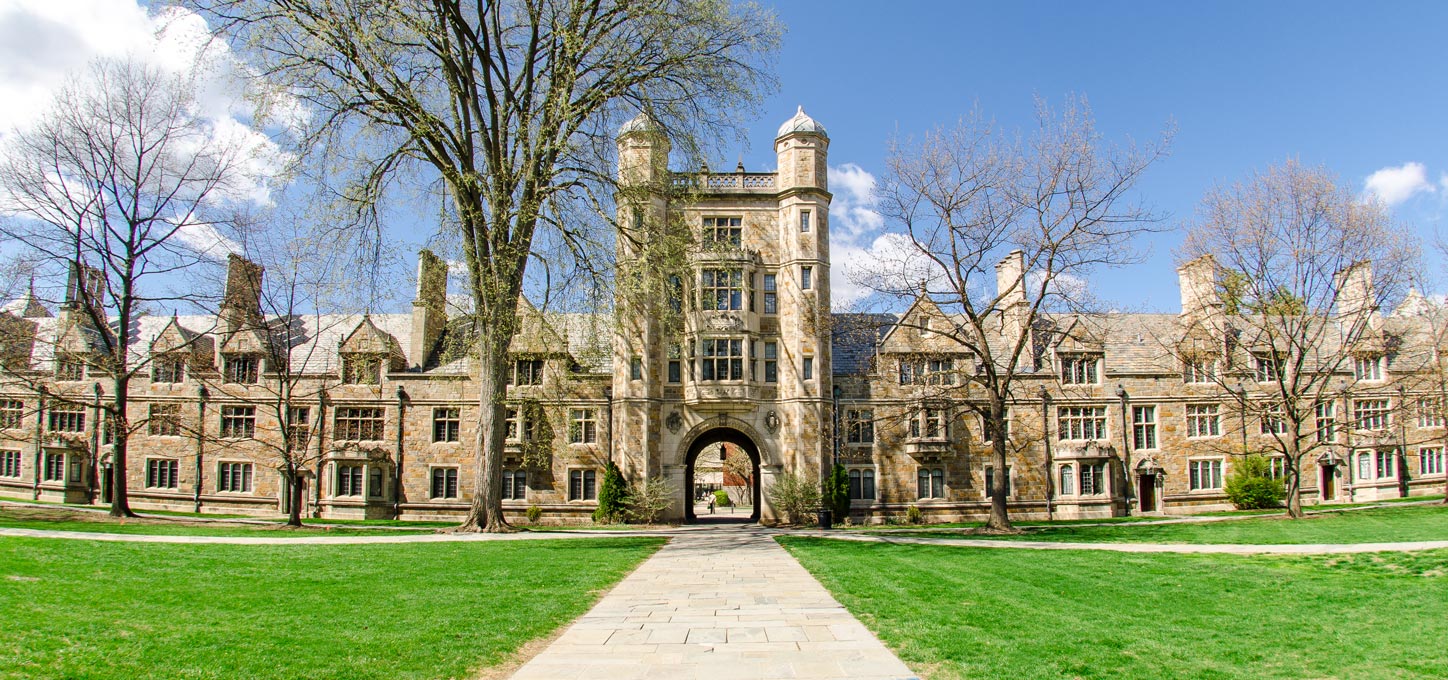As a student with a disability, you’re likely aware of some of the challenges that a traditional college setting can present. Lack of resources, information, accessibility and more are all things that can be frustrating to any student with disabilities.
This is where attending online college can be beneficial. Presenting the same experience online as in-person classes but without the need to leave your home, online college classes are a great option for students with disabilities. For those interested in attending college online as a person with disabilities, read on to learn more!
Table of Contents:
1. What are the Laws Protecting Students with Disabilities?
2. What Counts as a Disability in College?
3. How to Choose the Right School
4. Best Online Colleges for Students with Disabilities
5. Financial Aid for Students with Disabilities
6. Additional Information & Resources
What Are the Laws Protecting Students with Disabilities?
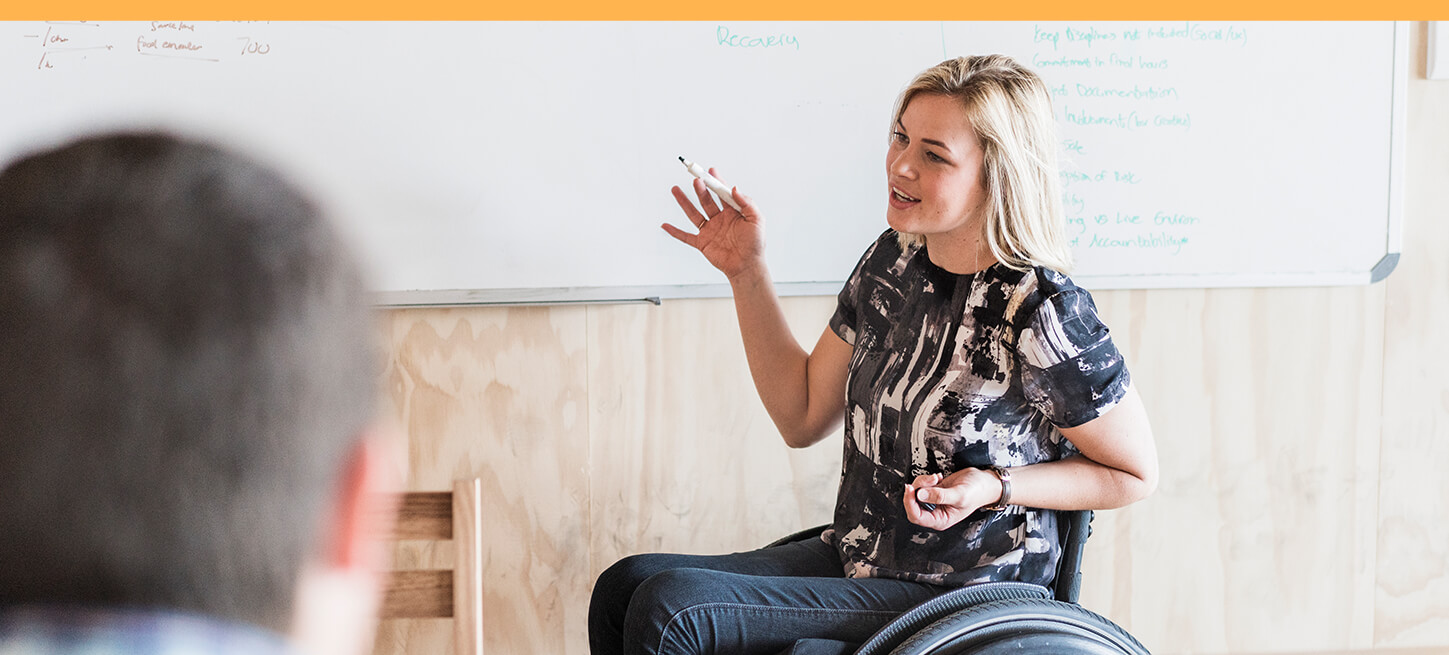
From cognitive to physical disabilities, being understood and represented matters greatly for those with disabilities. That’s why there’s legislation that assists and regulates public institutions with regard to people with disabilities. Keep reading to learn more about five of the most influential pieces of legislation out there.
Americans with Disabilities Act Amendments Act (ADAAA)
Originally passed by Congress in 1990 and amended in 2008, the ADAAA is a civil rights law that protects individuals with disabilities from discrimination in the workplace, school and other settings.
Though there is no specific mention of learning disabilities in ADAAA, under the federal definition of disability, learning, reading, thinking and concentrating are all considered “major life activities.” If a child is eligible for services under the Individuals with Disabilities Education Act (IDEA), they are qualified for protections under ADAAA.
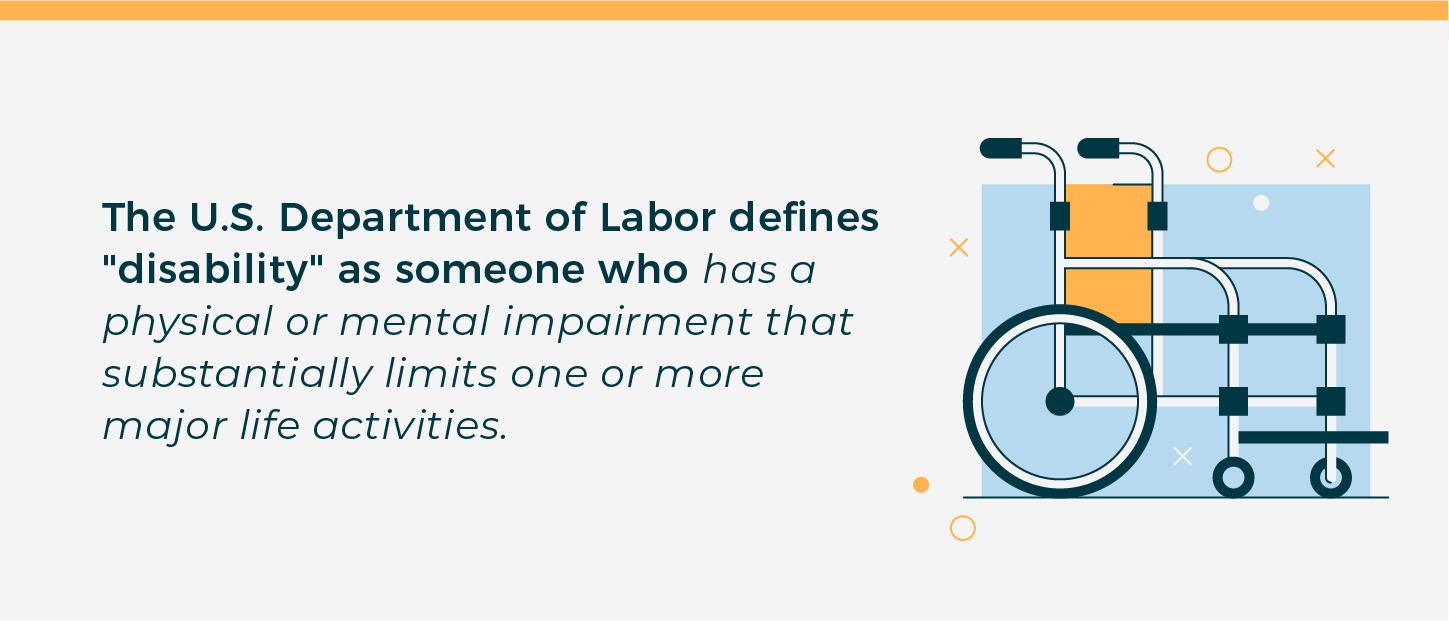
The ADAAA requires a broader interpretation of “disability” in schools, testing agencies and the workplace than the original law required. Due to this, individuals with learning disabilities should have an easier time qualifying for accommodations at school, work and testing facilities.
For more information, visit the National Center for Learning Disabilities (NCLD) ADAAA resource page.
Section 504
Section 504 of the Rehabilitation Act improves access to accommodations for students and adults with learning disabilities at school and in the workplace.
Section 504
Specifically, Section 504 of the Rehabilitation Act of 1973 is a civil rights law, designed to prohibit discrimination on the basis of disability in public and private programs and activities that receive federal financial assistance. Section 504 does not provide funding for special education or other related services, but does allow the federal government to remove funding from programs that don’t follow federal law.
Generally, if a child is eligible for services under the Individuals with Disabilities Education Act (IDEA), they are qualified for protection under Section 504. However, not all students covered under Section 504 are eligible for IDEA protections. Section 504 generally has a broader definition of disability, therefore pertaining to more people.
For more information, visit the NCLD ADAAA and Section 504 resource page.
Architectural Barriers Act (ABA)
The ABA is a federal law that requires that buildings and facilities that are designed, constructed, altered by or leased by a federal agency comply with federal guidelines for accessibility.
ABA oversees only the construction of new buildings, or alterations and leasing in existing buildings. These rules do not apply to the activities held within the building itself.
To learn more, visit the U.S. Department of Justice’s Guide to Disability Rights Laws resource page.
Individuals with Disabilities Education Act (IDEA)
IDEA is the nation’s federal special education law, ensuring public schools are serving the needs of students with disabilities. The law requires schools to provide special education resources and services to eligible students, as outlined in the student’s Individualized Education Program (IEP). Some other notable aspects of IDEA are that it:
- Provides specific guidelines for guaranteeing a free, appropriate public education (FAPE) for students with disabilities in the least restrictive environment (LRE).
- FAPE and LRE are the federally protected rights of every eligible student in all 50 states and U.S. territories.
- Requires every state to pass regulations that guide implementation of IDEA within the state’s schools.
- At a minimum, state regulations must provide all of the protections covered in IDEA.
- Some states may have additional requirements going beyond the minimum requirements of IDEA, with many offering handbooks or educational resources to parents to provide information on state-specific policies.
For more information, visit the NCLD IDEA resource page.
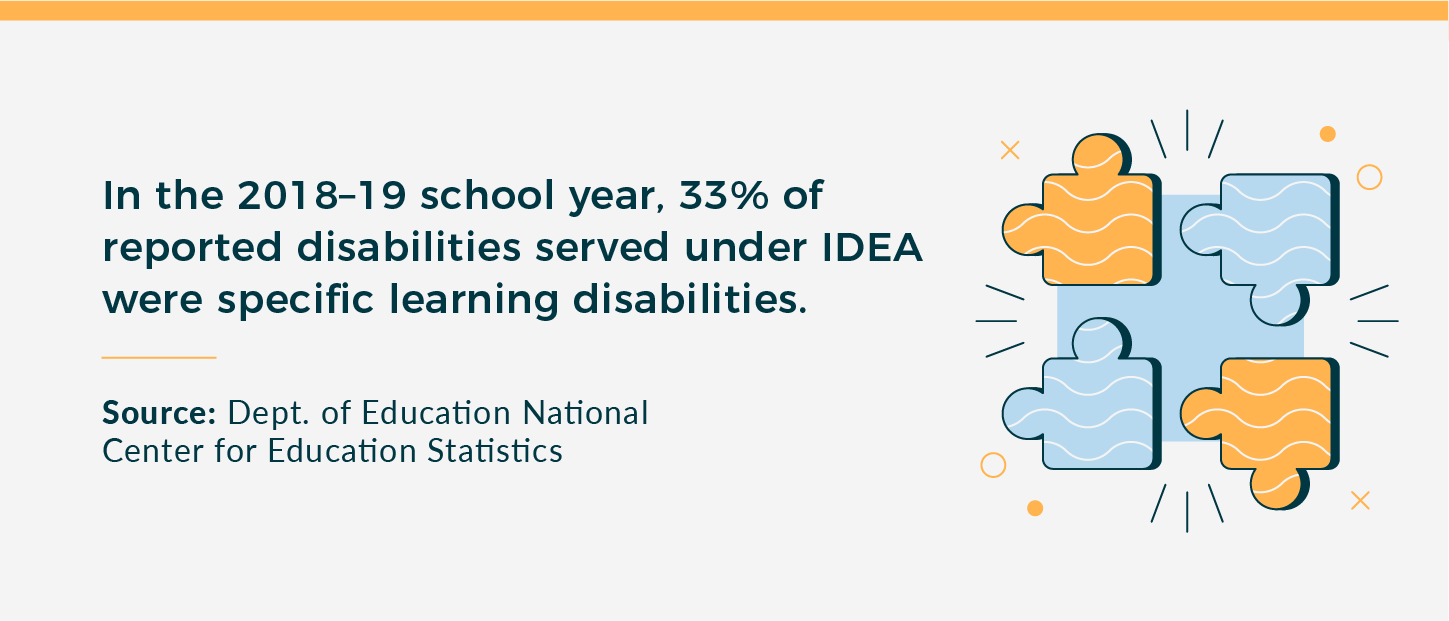
State Grant for Assistive Technology Program
This nationwide effort granted funding to all 50 states and U.S. territories to implement or improve provision of assistive technology for individuals with disabilities. The overall goal was to provide easily accessible and widely available assistive technology services and programs to individuals with disabilities and their families.
States are awarded annual grants for providing these assistive technologies to individuals with disabilities, with the amount of the annual award being decided largely by the state population.
For more information, visit the Administration for Community Living’s State Grant for Assistive Technology Program resource page.
What Counts as a Disability in College?

With all of the various conditions and terminology associated with having a disability, the proper definition can get lost in translation. That said, the commonly used definition explained by the United States Department of Labor and the federal government defines “disability” as:
Someone who:
- has a physical or mental impairment that substantially limits one or more “major life activities,” or
- has a record of such an impairment, or
- is regarded as having such an impairment
Going off of that definition, the following are umbrella terms for six conditions that fit the criteria listed by the federal government of a disability, and many are eligible for disability benefits and Social Security. This is not an exhaustive list, and many disability conditions are considered on a case-by-case basis.
1. Chronic Health Conditions
Chronic health conditions are visible disabilities, as well as invisible illnesses, that affect the person diagnosed for a lifetime or prolonged period of time, generally three months or longer. As of 2019, over 133 million Americans were diagnosed with a chronic health condition; over 40% of the country.
Some of these conditions include, among others:
- Digestive disorders, such as Crohn’s Disease
- Hematological conditions, like sickle cell disease
- Immune system disorders, including multiple sclerosis
- Respiratory illnesses, such as asthma
2. Developmental Disabilities
Developmental disabilities are defined as being a group of conditions due to an impairment in physical, learning, language or behavior areas. Approximately one in six American children have been diagnosed with a developmental disability.
Among others, developmental disabilities include:
- Attention-Deficit/Hyperactivity Disorder (ADHD)
- Autism Spectrum Disorder
- Cerebral Palsy
- Muscular Dystrophy
- Tourette Syndrome
3. Learning Disabilities
These are defined as any condition that affects the ability to understand or use spoken or written language, do mathematical calculations, coordinate movements or direct attention. Many of these conditions go undiagnosed in children until they reach school age.
Some examples of learning disabilities, among many others, include:
- Dyscalculia
- Dysgraphia
- Dyslexia
- Oral/Written Language Disorder
- Non-Verbal Learning Disabilities
- Reading Comprehension Deficit
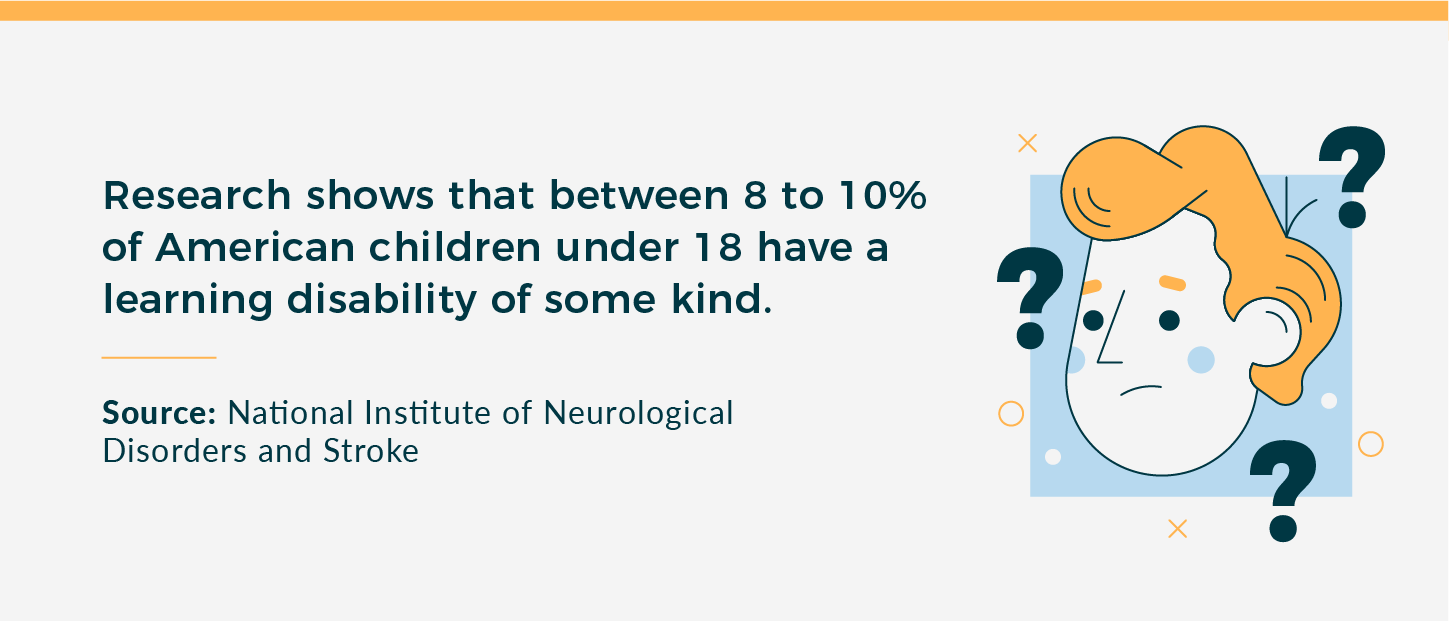
4. Neurological Diseases
Neurological disorders are any condition that affect the nervous system, including the brain, spinal cord and nerves that control the workings of your body. These conditions can affect your ability to do many things, including speaking, swallowing, learning or breathing. Neurologic diseases were found to be the largest cause of disability worldwide.
There are over 600 neurologic diseases. Some common ones are:
- Amyotrophic Lateral Sclerosis (ALS)
- Bell’s Palsy
- Brain tumors
- Cerebral Aneurysm
- Epilepsy and seizures
- Head injuries
- Huntington’s Disease
- Meningitis
- Muscular Dystrophy
- Parkinson’s Disease
5. Mobility Impairments
Mobility impairments are a number of conditions that affect a person’s ability to comfortably move, ranging from small difficulties to total paralysis. These neuromuscular or orthopedic disabilities affect a wide range of abilities, from walking or taking stairs to fine motor skills, like writing or typing.

6. Psychological Conditions
These are any conditions that affect the brain’s chemistry, often characterized by a combination of abnormal thoughts, perceptions, emotions, behavior and relationships with others. One in five U.S. adults are affected by psychological conditions, with depression being one of the main causes of disability worldwide.
Some of these conditions include:
- Anxiety Disorder
- Bipolar Disorder
- Depression
- Obsessive Compulsive Disorder (OCD)
- Panic Disorders
- Schizophrenia
7. Special Sense and Speech Disorders
Illnesses that fall into this category are diseases that affect one of your senses, including sight, hearing, vision or speech impairments.
Over 10% of American adults are affected by vision loss, whether they are entirely blind or have trouble seeing far away. In addition to blindness or vision loss, the following diseases are included in the Social Security Administration’s evaluation of Special Sense and Speech disabilities:
- Auditory Processing Disorder
- Blindness
- Deafness
- Dizziness
- Hearing Loss
- Macular Degeneration
- Meniere’s Disease
- Partial Sight
- Vertigo
- Visual Impairment
How to Choose the Right School

When it comes to choosing the best online school for you, there are several factors to keep in mind. First and foremost, you’ll want to ensure that the school you’re choosing can accommodate your condition. To ensure this, you can call their Disability Services department or reach out to a current student with a similar condition to see what their experience has been like so far. You can ask questions pertaining to modified classes, assistive technology, what options are available regarding classes and other questions related to your specific condition.
You’ll also want to make sure that the school in question will work with your lifestyle. To see what your ideal school looks like, lay out a list of your preferences. This includes your list of needs and wants, which could look like:
Needs:
- Closed captioning on video lectures
- Accessible coursework or coursework substitutes
- Disability services staff
Wants:
- Modified course options
- Hired note taker
- Ability to record lectures
Once you’ve figured out what your ideal school looks like, you can get started on the search for your ideal online college. Armed with your list of what you’re looking for and want to avoid in an online college, you can begin your search knowing the criteria that is important to you. Below, we’ve rounded up a list of five online colleges that cater to students with disabilities. Using that criteria along with our ratings methodology, you can feel confident that you’re choosing the right school from the best options out there.
Best Online Colleges for Students With Disabilities

1. Champlain College
Best for: Students with learning disabilities
Regarded as one of the best private institutions for students with learning disabilities, this college offers individualized consults with the Office of Accessibility to evaluate their needs, as well as what options are available to them. These consultations and options are conducted for both online and in-person students.
2. Concordia University, St. Paul
Best for: Students with learning disabilities
One of the most affordable online universities for students with learning disabilities, this university offers an individualized approach to education. The Office of Student Accessibility Services works in tandem with students and instructors to provide accommodations in both online and in-person classroom settings.
3. Gallaudet University
Best for: Deaf or hard of hearing students
The only university in the world that is designed specifically for deaf and hard of hearing students, this university offers online learning options that are fully accessible. Featuring captioned videos, ASL options and other resources, this is a leading institution in advocacy for students with disabilities.
4. Landmark College
Best for: Students with learning disabilities
Landmark College was the first university designed for and opened exclusively for students with learning conditions or disabilities, such as ADHD or autism. Students can earn bachelor’s and associate’s degrees online or in-person, and high school students can even earn dual-enrollment credits before enrolling or graduating high school.
5. University of Arkansas
Best for: Students with learning disabilities or physical impairments
The University of Arkansas is well-known for their Center for Educational Access (CEA). This on-campus center assists students with disabilities, both online and in-person, with finding accommodations that best fit their needs and circumstances
Benefits of Online College for Students with Disabilities
As a student with a disability, you’ve likely evaluated the pros and cons of both residential colleges versus online to see what’s best for you and your situation. To help with your decision, we’ve included four benefits that online colleges offer to students with disabilities.
1. Accommodating Environment
Since you would be attending college from the comfort of your own home, you won’t have to worry about ensuring the classroom is accessible. Whether you’re in a wheelchair, have a support animal or something else that would require accommodations in a residential college setting, you can attend classes and focus on the work — and not your environment.
2. Assistive Technology
With classes happening in a completely virtual environment, you can adapt your laptop or home computer with any number of accommodations that can assist your learning. From adaptive keyboards to predictive spell-check, you can use any of the assistive technology tools at your disposal to help you succeed.
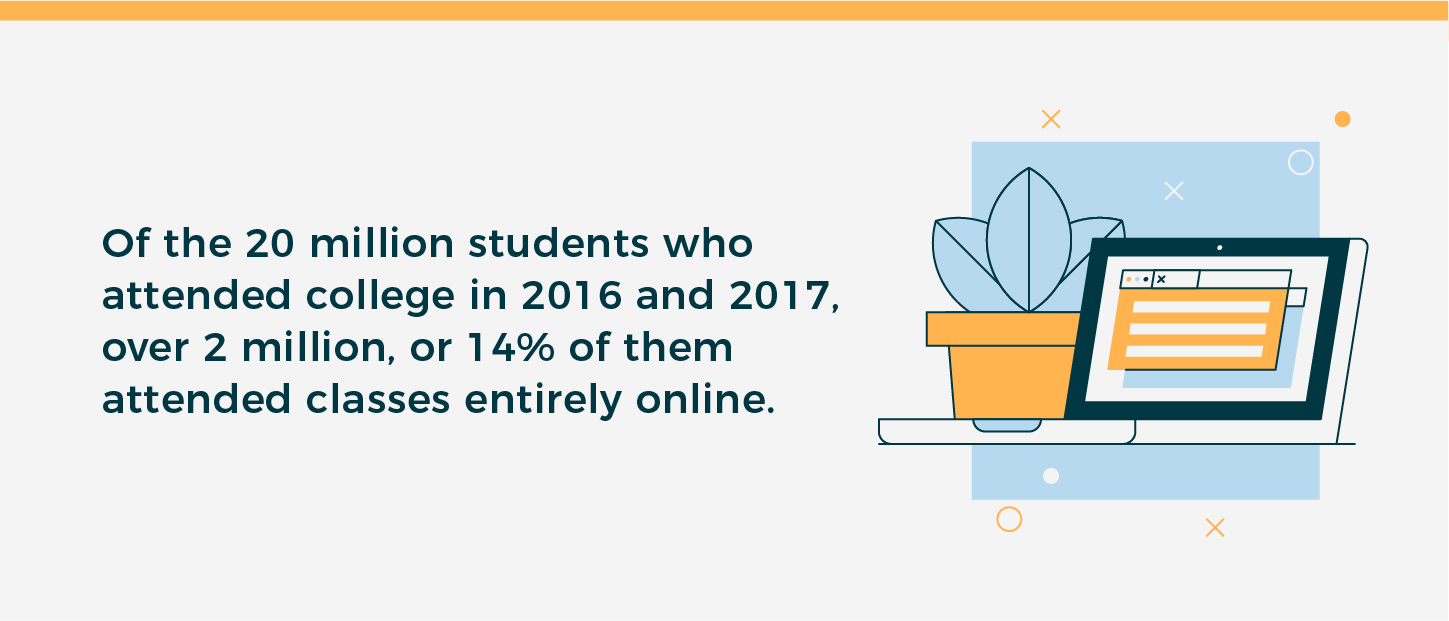
3. Specialized Resources
Since universities are required to have disability resources in place for students, you are entitled to these resources even as an online student. Here you can find information on your rights to course modifications, accessible classes and other resources tailored to your interests and condition.
4. Ability to Work Around Your Schedule
One of the biggest pros that comes with attending college virtually is that typically, classes don’t meet at set times; rather, they have set due dates and let students work at their own pace. As a result, you can earn your degree in a way that works best for you, and make your classes work around your schedule, not vice versa.
Financial Aid for Students with Disabilities

Being a student with a disability means you’re entitled to a number of scholarship and financial aid options that make funding your education easier and more accessible.
Scholarship Options
Below, we’ve found 10 scholarships reserved for helping students with disabilities. Read on to learn more!
1. AbbVie Cystic Fibrosis Scholarship
Award amount: $3,000 – $24,000
Scholarship details: This merit-based scholarship is reserved for students living with cystic fibrosis. Each year, 40 recipients receive $3,000 for use during the academic year, with two recipients receiving Thriving Student Scholarships for $24,000 each.
Requirements:
- U.S. citizen
- Diagnosed with cystic fibrosis by physician
- Enrolled in or awaiting acceptance from accredited institution for upcoming academic year
For more information, visit the AbbVie CF Scholarship page.
2. Anne Ford Scholarship
Award amount: $10,000
Scholarship details: Sponsored by the National Center for Learning Disabilities, this merit-based scholarship is awarded on a yearly basis ($2,500 per year over four years) to students with a documented learning disability and/or ADHD entering a full-time bachelor’s degree program.
Requirements:
- Graduating high school senior accepted to a four-year bachelor’s program
- Overall 3.0 GPA or higher on a 4-point scale or equivalent
- U.S. citizen
- Documented identified learning disability and/or ADHD and has utilized services, supports and/or accommodations
For more information, visit the National Center for Learning Disabilities Anne Ford Scholarship page.
3. Beth Carew Memorial Scholarship Program
Award amount: $500 – $6,000
Scholarship details: Sponsored by the Hemophilia Federation of America, this merit-based undergraduate scholarship is for any student with hemophilia, von Willebrand disease or a related, inherited bleeding disorder. Siblings or children of those with inherited bleeding disorders are not eligible to apply. Past recipients may reapply through their undergraduate career
Requirements:
- Diagnosed with an inherited bleeding disorder
- Volunteered time and energy to benefit bleeding disorder community
- Accepted to or enrolled in accredited two to four year undergraduate institution in the U.S.
- Must be a high school senior or undergraduate freshman, sophomore or junior
For more information, visit the Hemophilia Federation of America’s Beth Carew Memorial Scholarship page.
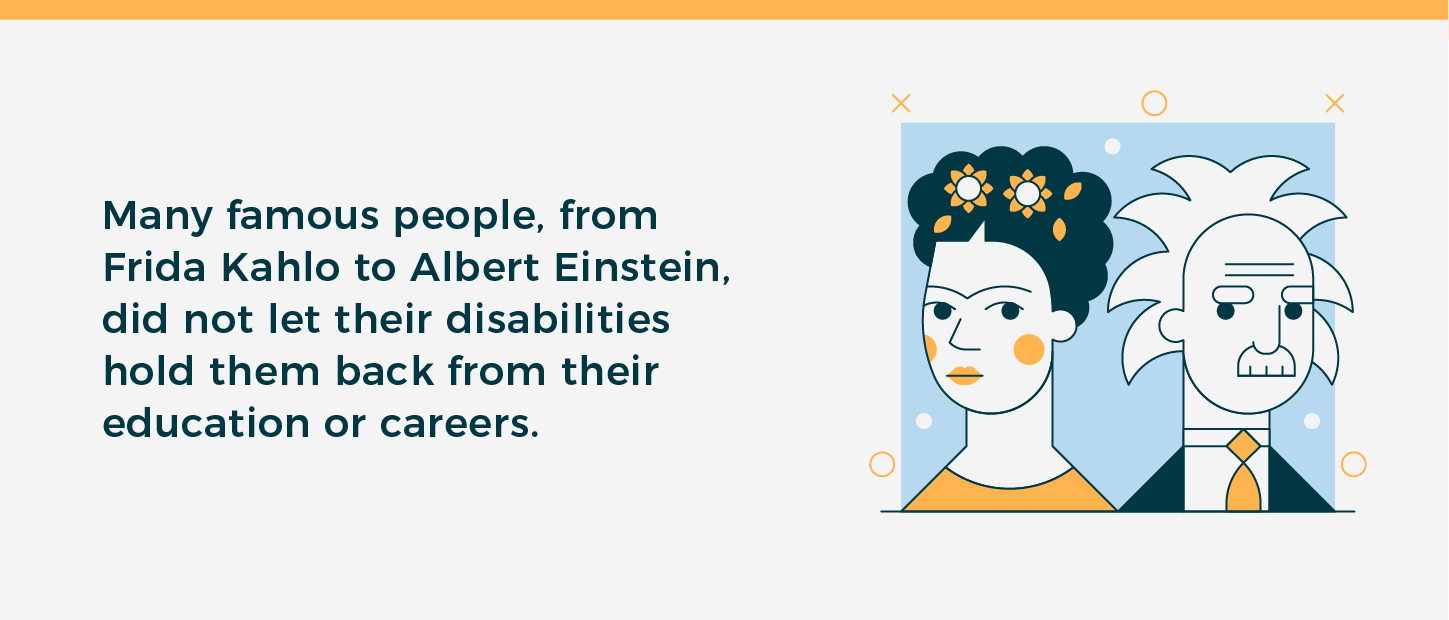
4. Claude S. Weiler Scholarship for Amputee College Students
Award amount: varies based on applicant
Scholarship details: Presented by the National Amputation Foundation, this is a merit-based scholarship for full-time undergraduate students with a major limb amputation. A “major limb amputation” is defined “as loss of limb beginning at or above the wrist or ankle.”
Requirements:
- Confirmed major limb amputation by attending physician
- U.S. citizen
- Enrolled full-time in a four-year institution in the U.S.
For more information, visit the National Amputation Foundation’s Claude S. Weiler Scholarship for Amputee College Students page.
5. Guthrie-Koch PKU Scholarship
Award amount: varies based on applicant
Scholarship details: This merit- and need-based scholarship is reserved for those diagnosed with phenylketonuria (PKU). To apply, applicants must be accepted to an accredited undergraduate institution before the scholarship is awarded, but may apply before acceptance is confirmed.
Requirements:
- Diagnosed with PKU and on diet treatment
- Accepted to undergraduate institution or technical school
For more information, visit the Guthrie-Koch PKU Scholarship page.
6. Marianjoy Scholarship Program
Award amount: $2,500
Scholarship details: Administered through the Northwestern Memorial Foundation, this community-funded scholarship is for funding higher education for individuals with permanent physical disabilities or functional impairments, which may include:
- Brain injury
- Musculoskeletal impairments: amputation, multiple trauma
- Neuromuscular disorders: multiple sclerosis, cerebral palsy, Guillain-Barre Syndrome
- Spinal cord injury
- Stroke
Requirements:
- Diagnosed with permanent physical disability or functional impairment
- Accepted to or attending accredited two- or four-year institution in the U.S.
For more information, visit the Marianjoy Scholarship Program website.
7. Organization for Autism Research (OAR) Scholarships
Award amount: $3,000
Scholarship details: OAR provides two $3,000 scholarships for full-time students with autism continuing their education. Applicants have two options to choose from:
- Schwallie Family Scholarship: Supports students attending two- to four-year universities, open to students with Asperger Syndrome.
- Lisa Higgins Hussman Scholarship: Supports students attending two-year institutions, life skills/postsecondary programs, or vocational, trade or technical schools. Intended for students facing challenges related to autism and are interested in attending programs that assist in transition-related skills such as skill-building and job-readiness.
Requirements:
- Established autism diagnosis from licensed medical professional
- Accepted to or enrolled full-time in postsecondary institution of higher learning
- Working toward certification or accreditation in particular field of study
For more information, visit the OAR Scholarships page.
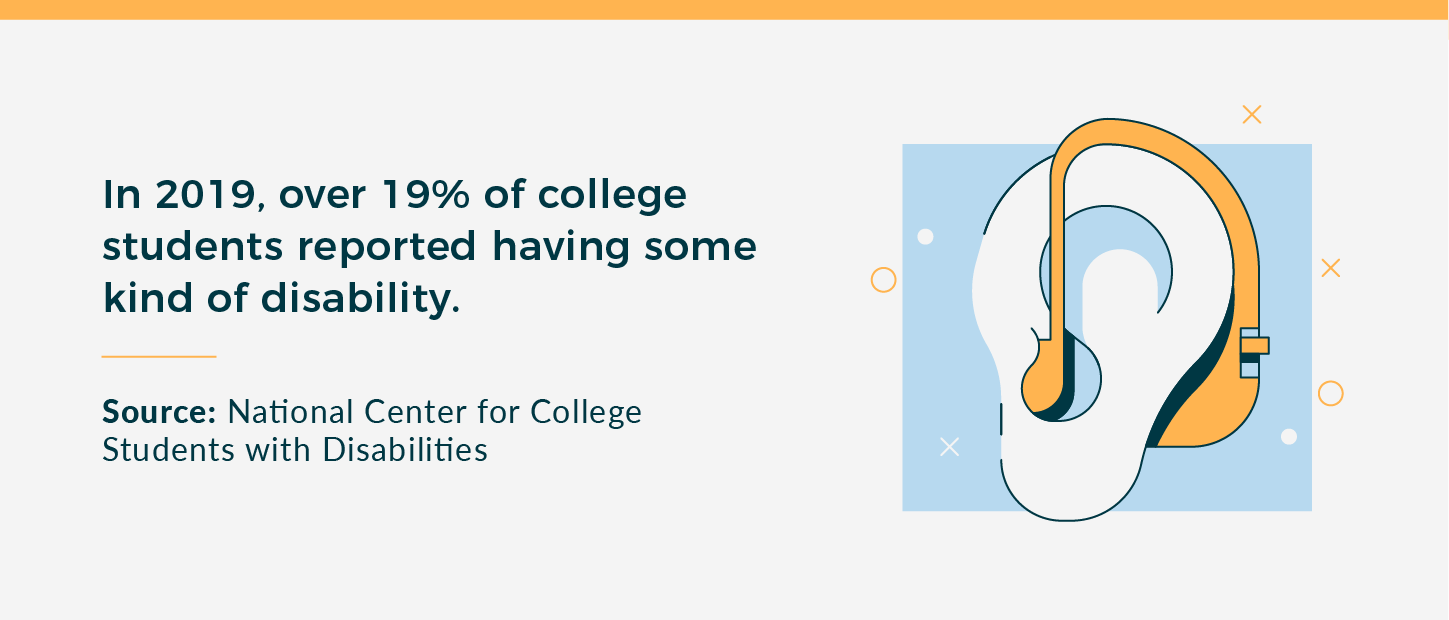
8. Rheumatoid Patient Foundation Scholarship Program
Award amount: $1,000
Scholarship details: This merit-based scholarship offers financial support for students continuing their education whose lives have been affected by rheumatoid disease (RD), which includes:
- Rheumatoid Arthritis
- Juvenile Rheumatoid Arthritis/Juvenile Idiopathic Arthritis
Requirements:
- Confirmed diagnosis of RD or parent with RD
- Applying, accepted to or enrolled in an accredited institution in the U.S.
For more information, visit the Rheumatoid Patient Foundation Scholarship Program website.
9. Sertoma Scholarship for the Hard of Hearing or Deaf
Award amount: $1,000
Scholarship details: This merit-based scholarship is the leading scholarship for hard of hearing or deaf students. This is reserved for students with clinically significant, bilateral hearing loss who are graduating from high school or are enrolled in four-year colleges or universities.
Requirements:
- Diagnosed with minimum 40dB bilateral hearing loss, as evidenced on audiogram by an SRT & PTA of 40dB or greater in both ears
- U.S. citizen
- Pursuing bachelor’s degree full-time at accredited college or university in the U.S.
- Have minimum cumulative 3.2 GPA on 4.0 unweighted scale
- High school senior: cumulative GPA for grades 9–11 and first semester of grade 12
- College freshman: cumulative GPA of all of high school and first semester of college
- College sophomore or above: cumulative GPA for all completed college-level semesters
For more information, visit Sertoma’s Hard of Hearing or Deaf Scholarship page.
10. UCB Family Epilepsy Scholarship Program
Award amount: $5,000 – $10,00
Scholarship details: This need- and merit-based scholarship is reserved for people living with epilepsy, their family members or caregivers pursuing higher education in the form of an associate’s, bachelor’s or graduate degree. 30 applicants will receive scholarships up to $5,000 each, two applicants will receive the Epilepsy Leader Scholarship up to $10,000, and one applicant will be awarded the Joe D’Souza Memorial Scholarship of up to $10,000.
Requirements:
- U.S. citizen
- Diagnosed with or a family member or caregiver of a person with epilepsy
- Accepted to or enrolled in associate’s, bachelor’s or graduate degree program or trade school program
For more information, visit the UCB Epilepsy Scholarship home page.
Other Financial Resources
In addition to these scholarships, here are 10 more places to continue your search for scholarships and financial aid to fund your college education.
- 35 Scholarships for Students with Disabilities
- Disabled Scholarship Opportunities
- Disability Scholarships
- Eligibility for Students with Intellectual Disabilities
- Financial Aid for Students with Disabilities
- Grants for Students with Disabilities
- Individuals with Disabilities Education Act
- Scholarship Opportunities for Students with Disabilities
- Scholarships for Students with Illnesses and/or Disabilities
- Students with Disabilities Grants
Additional Information & Resources

In addition to all of this information on choosing an online school as a student with disabilities, you may be wondering what kinds of resources are out there for actually attending online college. We’ve rounded up information on assistive technology, class modifications and other resources that can all work together to help you succeed in an online class setting.
Assistive Technology for Students with Disabilities
For some students with disabilities, assistive technology can make a world of difference in comprehension, assignments and success in class. Below you’ll find information about five assistive technology options used in virtual classrooms, from common ones like video caption enablers to newer creations like alternative keyboards.
1. Alternative Keyboards
Perfect for the virtual classroom, these are programmable keyboards that allow the user to customize the function and appearance of a standard keyboard. Possible customization options include grouping keys by color and location, reducing input choices or adding graphics for increased comprehension.
Best for: Students with learning disabilities or who have trouble concentrating or typing.
2. Speech Synthesizers or Screen Readers
These programs display and read aloud text on a computer screen, which includes text written by the user, appearing on a website or pages that have been scanned in from an outside source.
Best for: Students who have trouble reading, seeing or understanding text on a screen.
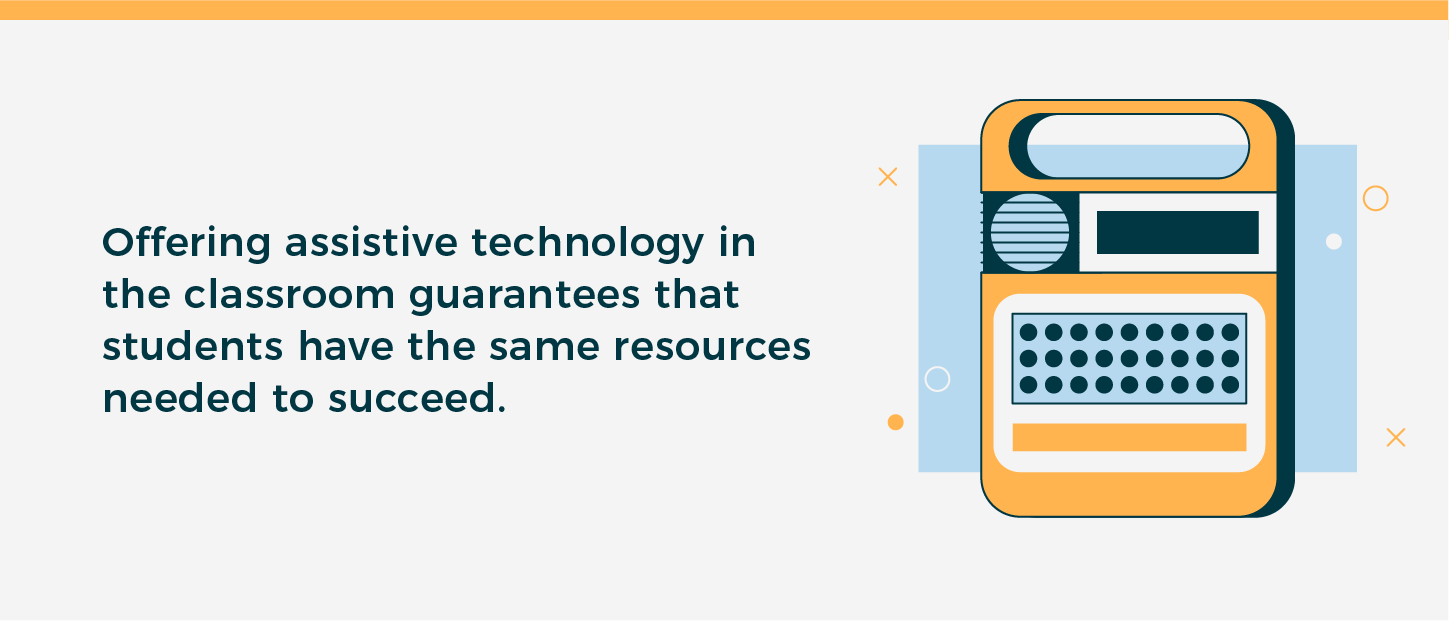
3. Speech Recognition Programs
This technology works together with a word processor on a laptop or desktop computer, where the user speaks or dictates into a microphone and the spoken words appear as text on a computer.
Best for: Students whose speaking and oral language abilities are better than their writing skills.
4. Talking Calculators
As the name suggests, these calculators have built-in speech synthesizers that dictate the keys pressed by the user and vocalizes the solution to the problem once it has been solved.
Best for: Students who have trouble seeing or understanding the screens of calculators.
5. Video Caption Enablers
These programs are designed for classes where professors record their lectures and upload them online. These programs have closed-caption features that display subtitles on the screen, allowing students to both see and hear the material being shared.
Best for: Students who are deaf or hard of hearing.
Modified Course Options for Students with Disabilities
Sometimes modifications need to be made to an existing course to ensure you can succeed. Below are some course modifications you’re entitled to as a student with disabilities. Check with your instructor and institution for specifics related to your condition, class and college.
1. Additional Time to Complete Assignments
Many students with disabilities may require more time to complete tests, projects, assignments or even graduate. Make sure you discuss your options with your professor, and some courses may require a note from a physician showing you require this adjustment.
Best for: Students with learning or processing disabilities who have trouble with time constraints.
2. Adjusted Course Instruction
Sometimes, courses demand something from a student with a disability that may not be feasible for them to complete. Before class begins, review the syllabus to see if there are any sections or modules that would be difficult for you to complete. If so, speak to your professor about why this isn’t possible for you, and you can work together to find a substitute assignment for you.
Best for: Any student with a disability that precludes them from accurately completing an assignment.
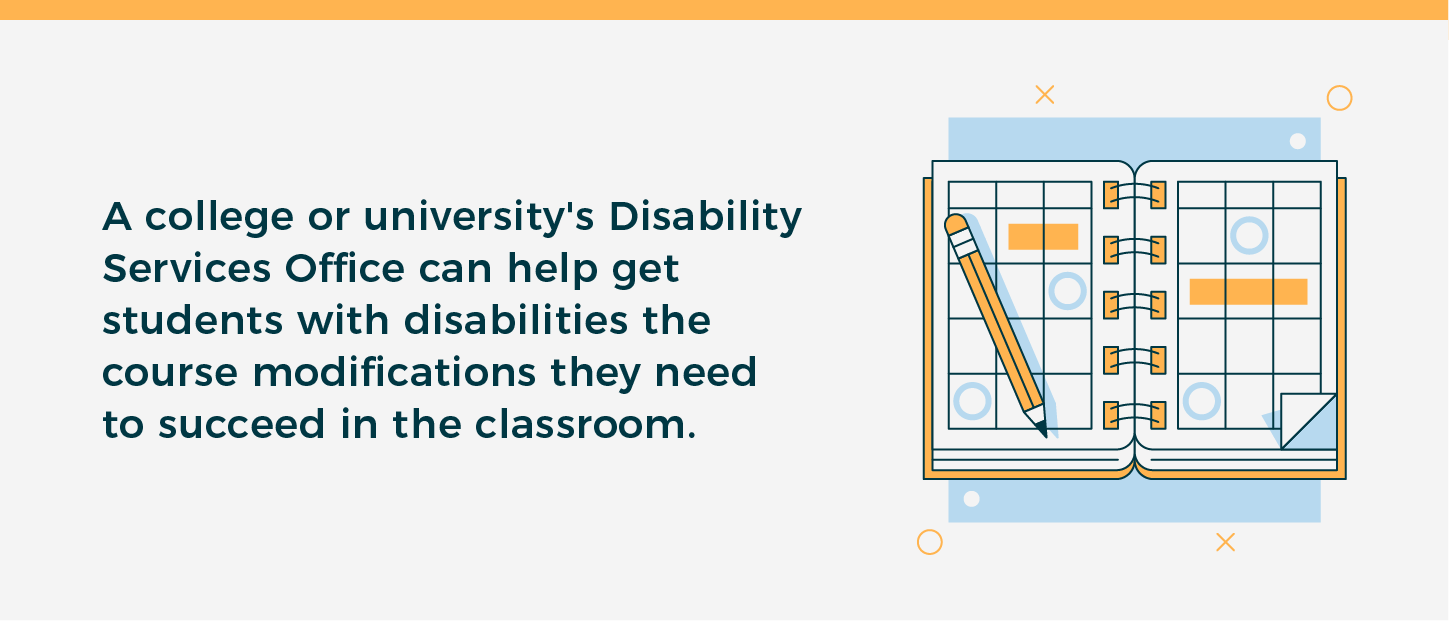
3. Modified Performance Evaluations
For many students with disabilities, their best may look different from that of other students. Due to this, it’s only fair that your metrics be modified. Speak to your professor or Disability Services representative to see what this modification would look like for you, while remaining fair to the integrity of the class.
Best for: Students with learning, sensory or mobility impairments.
4. Provided Learning Resources
Some students have trouble learning, processing or multitasking during lectures or presentations. To help, universities can offer interpreters, note takers, readers, telecommunication devices and other forms of assistive technology that can ensure you have all the materials you need to succeed.
Best for: Students with processing, auditory, hearing or learning disabilities.
5. Recorded Classes Through Audio and Video
Online courses tend to operate in one of two ways. They are either work-focused with assignments and modules to complete with little to no interaction with the instructor, or the instructor pre-records their lecture and uploads it to the class website. If the class operates in the second way, you are entitled to request closed captions or a transcript of their lecture for your learning purposes.
Best for: Students with auditory processing difficulties.
Additional Resources
To ensure you’re as knowledgeable as you can be about attending online college as a student with disabilities, we’ve included some additional resources to help you learn more.
- AbleData
- American Association of People With Disabilities
- Assistive Technology for Students with Learning Disabilities
- Association on Higher Education and Disability
- College Autism Spectrum
- Disability Rights Laws in Public Primary and Secondary Education
- Learning Disabilities Association of America
- National Center for College Students with Disabilities
- National Center for Learning Disabilities
- National Institute on Mental Health
- National Student Speech Language Hearing Association
- The Arc
- U.S. Department of Education Disability Discrimination Resources
- U.S. Department of Education Protecting Students with Disabilities
- U.S. Department of Justice Guide to Disability Rights Laws
For students with disabilities, choosing the best path forward for higher education can be overwhelming. Online college can be an excellent option for your individualized needs, as well as providing you with the same accessible options, attention and resources you need to succeed in a higher education setting.
Sources: U.S. Department of Labor | College Scholarships | Disability Secrets | Reading Rockets | EdTech Magazine | Department of Education National Center for Education Statistics | Centers for Disease Control and Prevention | Learning Disabilities Association of America | National Center for Biotechnology Information



